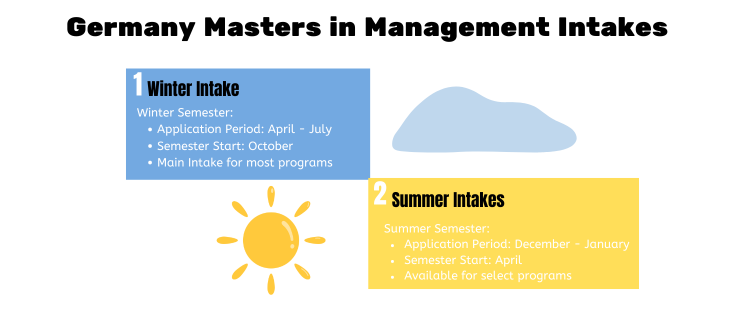A Masters in Management in Germany is one of the premium options that help students enhance their professional careers in global business. One of the major reasons one opts for a MiM in Germany is the strong support and emphasis of the country on research and innovation. Interestingly, because the land of Germany is strong in economic backing and an educationally superior system, the land ensures increased measurements for the students through the numerous programs of MiM. Its strong academic performance combined with enthusiastic student life and a strong job market had been the factors drawing international students to the country. Further, with the tap of global companies, more so in cities like Munich, Frankfurt, and Berlin, there is so much in prospect for the graduates looking out for an interesting career field-mainly in finance, marketing, consulting, etc.
The Masters in Management in Germany attracts a very diverse student body from around the world.
Requirements for Masters in Management in Germany
Applying for a MiM program in Germany involves several key steps and requirements:
| Minimum requirements | Details |
| Bachelor’s Degree | Bachelor’s degree from an accredited institution. This should prove the quality of your previous education and make it easier for German universities to recognize your degree. |
| Minimum GPA Requirement | 2.5 on a 4.0 scale (77 – 79%) |
| Official Transcripts | Must include grades and details of courses. |
| Language Requirements | English Taught Program: TOEFL: minimum score of 90 IELTS: minimum score of 6.5 Cambridge English: C1 Advanced or C2 Proficiency. Duolingo: Minimum score varies by program. German Taught Program : TestDaf: minimum scores vary by program. Goethe Institut:Goethe-Zertifikat C1 or C2 |
| CV/Resume | Detailed CV or Resume. Focus on Clarity and Relevance. |
| Standardized Test | GMAT OR GRE, if required GMAT: Minimum score of around 600 GRE: Competitive scores typically above 300. |
| Letter of Recommendation | From academic or professional referees. Should provide detailed insights into your qualifications and potential. Choose your referees who know you well and can write strong, relevant recommendations. |
| Statement of Purpose | Explain your reasons for choosing the program, your career goals, and why you’re a good fit. Write between 500-1000 words. |
| Visa Requirements | Student visa application. Proof of admission. Proof of Financial Resources. Apply for the visa as soon as you receive your admission letter to avoid delays. |
| Application Fee | Payment of application fee. Payment is required before the application deadline. This typically ranges from €50 to €150 |
Best Public Universities for Masters in Management
Here are some of the Best Public Universities providing Masters in management programs in Germany. These universities’ degrees are globally recognized and they are known for their rigorous academic standards.
| University Name | Location | Program Name |
|---|---|---|
| Ludwig Maximilian University of Munich (LMU) | Munich | Master in Management (M.Sc.) |
| University of Mannheim | Manheim | Master in Management (M.Sc.) |
| Technical University of Munich (TUM) | Munich | Master in Management & Technology (M.Sc.) |
| Humboldt University of Berlin | Berlin | Master in Economics and Management Science (MEMS) |
| University of Cologne | Cologne | Master of Science in Business Administration (M.Sc.) |
| Goethe University Frankfurt | Frankfurt am Main | Master of Science in Management (M.Sc.) |
| University of Göttingen | Göttingen | Master of Science in Management (M.Sc.) |
| University of Stuttgart | Stuttgart | Master of Science in Management and Technology (M.Sc.) |
Related Post: Best Cyber Security University in Germany
Best Private Universities for Masters in Management
Here are some of the Best Universities in Germany which are known globally for their academic excellence and industry tie-ups.
| University Name | Location | Program Name |
| WHU – Otto Beisheim School of Management | Vallendar/Düsseldorf | Master in Management (M.Sc.) |
| European School of Management and Technology (ESMT) | Berlin | Master in Management (M.Sc.) |
| Frankfurt School of Finance & Management | Frankfurt am Main | Master in Management (M.Sc.) |
| HHL Leipzig Graduate School of Management | Leipzig | Master in Management (M.Sc.) |
| Munich Business School | Munich | Master in International Business (M.A.) |
| SRH Berlin University of Applied Sciences | Berlin | Master of Science in International Management (M.Sc.) |
| GISMA Business School | Berlin/Hannover | Master in International Business Management (M.A.) |
Related Post: Study abroad consultants in Gurugram
Masters in Management in Germany: Intakes

Most universities in Germany have two intakes: the winter semester, which commences in September/October, and the summer semester, which begins in March/April. The winter semester is more favored by many students since more choices are available for course studying at that particular time.
Program Structure and Specialization
A Master’s in Management in Germany typically runs between 1 to 2 years and comprises a mix of core courses, electives, and practical elements. There is also the possibility to consider a broad array of specializations, from finance, marketing, strategy, and operations, in order to gain further flexibility in shaping one’s education in line with career aspirations. Many programs include internships, consulting projects, or company collaborations that put students in touch with real-world business challenges right at the beginning of their studies.
Global Perspective and International Exposure
The programs of a Masters in Management in Germany include students from all over the world. Such a multicultural environment improves the learning experience, for it gives the students a worldwide view on business and management practices. Most of the programs are taught in English, thus allowing international students into the programs and preparing graduates for a career in a globalized business environment.
Job Roles after Masters in Management from Germany
Graduates from Masters in Management in Germany will have a very broad range of career options across industries. Some of the common roles are:
- Management Consultant: Management consultant provides advice on organizational business strategies, operations, and management practices.
- Business Development Manager: The individual in this role leads the growth of business opportunities and partnerships.
- Project Manager: A project Manager is responsible for managing projects through to completion, ensuring the deadlines and set goals of the organization are met.
- Marketing Manager: The marketing manager oversees marketing strategies and campaigns for the company, ensuring increased sales and brand awareness.
- Financial Analyst: Financial analyst is to provide investment analytical data to the top management for proper decision-making and strategy formulation.
- Human Resource Manager: Human resources Manager is responsible for Recruitment, Training, Employee Relations, and Organizational Development, all toward company goals.
- Supply Chain Manager: Supply Chain Manager is accountable for the end-to-end supply chain process, overseas logistics, and assures that goods and services flow effectively.
Salary Expectations
- Graduate level: Most usually, graduates secure an average of €45,000 – €60,000 per annum: depending upon the size of the company and industry sector.
- Senior: Experience can easily give them €60,000 to €80,000 salaries with most preferred institutes.
- Top: Professionals can bag up to €100,000; and in executive posts or special categories, it can be more.
| Job Role | Average Annual Salary |
| Management Consultant | €60,000 – €85,000 |
| Marketing Manager | €45,000 – €70,000 |
| Financial Analyst | €45,000 – €65,000 |
| Investment Banker | €65,000 – €100,000 |
| Human Resources Manager | €50,000 – €70,000 |
| Supply Chain Manager | €50,000 – €75,000 |
| Operations Manager | €50,000 – €75,000 |
| Strategy Consultant | €60,000 – €90,000 |
| Sales Manager | €50,000 – €70,000 |
| Project Manager | €55,000 – €80,000 |
Conclusion
Master in Management in Germany is a premier opportunity for the students.
There are different programs available in the Management field. One can opt their field by their area of interest and area of expertise lies.
In conclusion, a Masters in Management in Germany gives an excellent opportunity for one’s professional and personal development with studies at the most renowned institutions, work experience, and international exposure. High-quality universities, a developed economy, and lively student life are the combinations through which Germany proves itself to be a perfect destination for advanced and leading management education.
FAQs
Can I enroll in a Master’s in Management (MiM) program in Germany without a GMAT?
Yes, we can do Masters in Management in Germany without GMAT. Some German universities do offer MiM without a GMAT score. Such colleges have some other criteria on which they assess applicant’s academic performance, work experience, language proficiency, and motivation.
What is the total expected cost of studying for a Master’s in Management in Germany for one year?
The total estimated cost for one year, including tuition fees, living expenses, health insurance, student fees, and additional costs, is approximately:
- Public Universities: €12,500 to €21,040 per year.
- Private Universities: €22,500 to €38,040 per year.
Is it cheaper to study in Germany compared to other countries?
Yes, studying in Germany can be more affordable compared to countries like the USA, UK, or Australia. This is because Germany offers education at low or no tuition fees at public universities and reasonable living costs.
Can I pursue a Master’s in Management (MiM) in Germany in English?
Yes, many universities in Germany offer Master’s in Management programs entirely in English. If you’re not good in the German language you can opt for the English language program which would be more beneficial for you.
Related Post
MS in Business Analytics in Germany
Masters in Supply Chain Management in Germany
Aerospace Engineering in Germany
MS in Data Science in Germany












